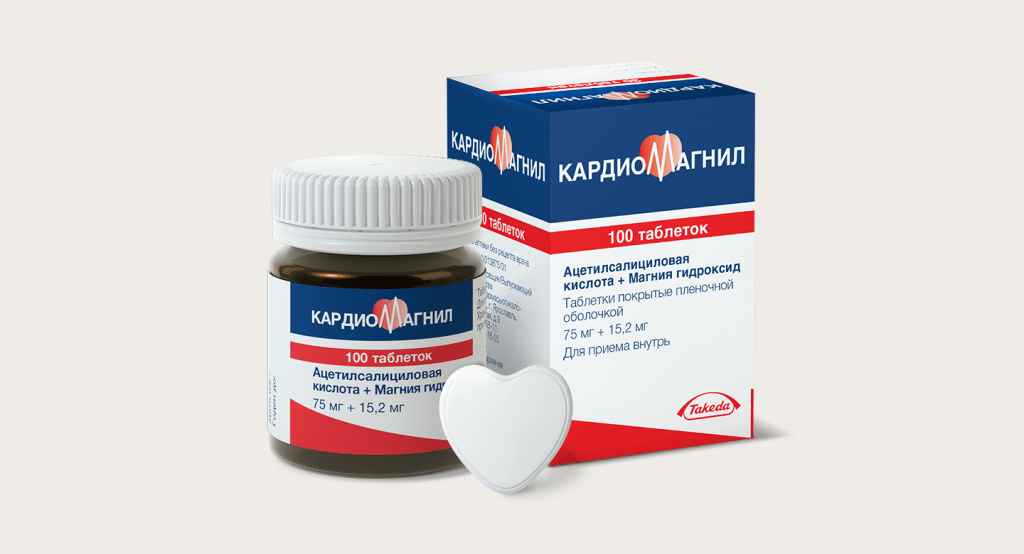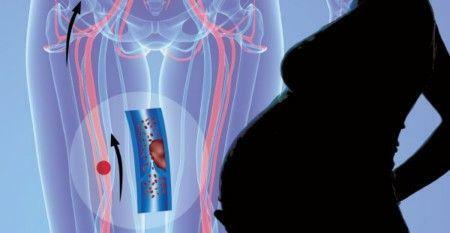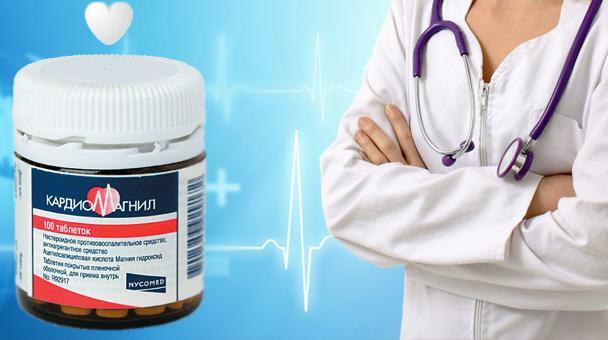Content
- Indications for treatment with Cardiomagnum during pregnancy
- The use of Cardiomagnyl in the 1st trimester of pregnancy
- The use of Cardiomagnyl in the 2nd trimester of pregnancy
- The use of Cardiomagnyl in the 3rd trimester of pregnancy
- The consequences of treatment for the fetus
- Cardiomagnet when planning pregnancy
- Important from the instructions for Cardiomagnyl
- Group
- pharmachologic effect
- Indications
- Contraindications
- Method of administration and dosage
- Side effect
- Overdose
- Average degree of overdose
- Severe overdose
- Manufacturers
- Application for breastfeeding
- special instructions
- Storage conditions
- Shelf life
- How can you replace the drug
Indications for treatment with Cardiomagnum during pregnancy
Despite the fact that aspirin has analgesic, anti-inflammatory and antipyretic properties, its dosage in Cardiomagnum is capable of performing only one function - antiplatelet. Thus, it is prescribed at the risk of pathological thrombosis. It makes no sense to take a remedy for fever or headache, since it will not give the desired effect.

The process of carrying a child is associated with the risk of thrombosis. Varicose veins are considered one of the most common complications. According to statistics, it occurs in half of all pregnant women. This is due to the compression of the vessels by the uterus and an increase in the volume of circulating blood. It is characterized by a significant slowdown in blood flow, which creates favorable conditions for the formation of a clot.
Also, during pregnancy, the composition of the blood changes significantly - it becomes more viscous, the risk of activation of coagulation processes increases. This is primarily due to an increase in the concentration of fibrinogen. In order not to miss hypercoagulability, the pregnant woman needs to do blood tests. A coagulogram will show an excess of this protein, an increase in the erythrocyte sedimentation rate (ESR)
In addition, changes in hormonal levels affect increased blood coagulation. During pregnancy, the concentration of progesterone increases sharply. It helps to relax the walls of blood vessels, because of which the latter expand and create conditions for stagnation.
If analyzes and other examinations confirm the presence of these pathological situations in the expectant mother, the doctor prescribes Cardiomagnet for her.
Another specific indication is placental insufficiency - a condition in which the normal functioning of the placenta is disrupted due to microcirculation disorders. Cardiomagnet in this case is taken as part of complex therapy.
In addition, it can be used for pathologies of the cardiovascular system unrelated to pregnancy:
- thrombophilia - a genetic predisposition to increased blood clot formation;
- heart rhythm disturbances (atrial fibrillation);
- ischemic heart disease (angina pectoris);
- high blood pressure (hypertension);
- myocardial hypertrophy;
- surgical interventions on the heart and blood vessels;
- the presence of artificial implants (stents, pacemakers, etc.)
In each case, the doctor must consider the individual characteristics, take into account the balance of benefits and possible harm, and also study the options for using alternative drugs.
The use of Cardiomagnyl in the 1st trimester of pregnancy
Most likely, you will not be prescribed Cardiomagnet in the first trimester of pregnancy, since during this period the fetus is most susceptible to negative effects from the drug. The medicine can affect the formation of the basic systems of a small organism, irreversibly disrupting this important process. Doctors point to the tetragenic effect of acetylsalicylic acid, which can cause miscarriage due to detachment of the ovum. Along with Cardiomagnil, Aspirin is not prescribed for the 1st trimester.

The use of salicylates in high doses in the first trimester of pregnancy is associated with an increased incidence of fetal defects.
The use of Cardiomagnyl in the 2nd trimester of pregnancy
From the second trimester, the effect of Cardiomagnyl is less pronounced and the appointment can be justified, so that the likely benefits of treatment are higher than the harm. But there are still risks for the fetus and the expectant mother. Doctors prescribe the minimum dose: 1 table. (75 mg aspirin) per day or half a tablet Cardiomagnyl Forte. The duration of treatment should be monitored by a doctor.
The use of Cardiomagnyl in the 3rd trimester of pregnancy
Only up to the 36th week of pregnancy, Cardiomagnet can be prescribed. The risk of bleeding and delayed labor prevents continued treatment.
In the third trimester of pregnancy, salicylates in a high dose (> 300 mg / day) cause:
- inhibition of labor;
- premature closure of the ductus arteriosus in the fetus;
- increased bleeding in the mother and fetus;
- intracranial hemorrhage, especially in premature babies.
The consequences of treatment for the fetus
Prescribing ASA in excess of a dose of 100 mg per day can cause in the fetus:
- cardiopulmonary toxicity (with premature closure of the Batalov duct and pulmonary hypertension)
- renal dysfunction with the sequential development of renal failure and a decrease in amniotic fluid.
Cardiomagnet when planning pregnancy
The use of ASA can reduce fertility, and therefore should not be used in women wishing to become pregnant. If ASA treatment is necessary, treatment should be as short as possible and the dose should be as low as possible. The effect on fertility is reversible.

Important from the instructions for Cardiomagnyl
| Film-coated tablets | 1 tab. |
| active ingredients: | |
| acetylsalicylic acid (ASA) | 75.0 / 150.0 mg |
| magnesium hydroxide | 15.2 / 30.39 mg |
| excipients: corn starch - 9.5 / 19.0 mg; MCC - 12.5 / 25.0 mg; magnesium stearate - 150.0 / 305.0 mcg; potato starch - 2.0 / 4.0 mg | |
| film shell: hypromellose (methylhydroxypropylcellulose 15) - 460.0 μg / 1.2 mg; propylene glycol - 90.0 / 240.0 μg; talc - 280.0 / 720.0 mcg |
Group
Combined products containing acetylsalicylic acid
pharmachologic effect
NSAIDs, antiplatelet agent. The mechanism of action of acetylsalicylic acid is based on irreversible inhibition of the enzyme cyclooxygenase (COX-1), as a result of which the synthesis of thromboxane A2 is blocked and aggregation is suppressed platelets. It is believed that acetylsalicylic acid has other mechanisms for suppressing platelet aggregation, which expands the scope of its application in various vascular diseases. Acetylsalicylic acid also has anti-inflammatory, analgesic and antipyretic effects.
Magnesium hydroxide, which is part of Cardiomagnyl, protects the gastrointestinal mucosa from the effects of acetylsalicylic acid.
Indications
Primary prevention of cardiovascular diseases such as thrombosis and congestive heart failure if present risk factors (for example, diabetes mellitus, hyperlipidemia, arterial hypertension, obesity, smoking, old age).
Prevention of recurrent myocardial infarction and blood vessel thrombosis.
Prevention of thromboembolism after vascular surgery (coronary artery bypass grafting, percutaneous transluminal coronary angioplasty).
Unstable angina.
Contraindications
Hypersensitivity to ASA, excipients of the drug and other NSAIDs, cerebral hemorrhage; bleeding tendency (vitamin K deficiency, thrombocytopenia, hemorrhagic diathesis); bronchial asthma induced by the intake of salicylates and NSAIDs; erosive and ulcerative lesions of the gastrointestinal tract (in the acute phase); gastrointestinal bleeding; severe renal failure (creatinine clearance less than 10 ml / min.); pregnancy (I and III trimesters); lactation period; deficiency of glucose-6-phosphate dehydrogenase; simultaneous reception with methotrexate (more than 15 mg per week); children under 18 years of age.
Method of administration and dosage
The tablets should be swallowed whole with water. If desired, the tablet can be broken in half, chewed or pre-ground.
For the primary prevention of cardiovascular diseases such as thrombosis and congestive heart failure in the presence of risk factors (eg, diabetes mellitus, hyperlipidemia, hypertension, obesity, smoking, old age) are prescribed 1 tab.
Cardiomagnyl containing acetylsalicylic acid at a dose of 150 mg on the first day, then 1 tab. Cardiomagnet containing acetylsalicylic acid at a dose of 75 mg 1 time / day.

For the prevention of recurrent myocardial infarction and blood vessel thrombosis, 1 tab is prescribed. Cardiomagnet containing acetylsalicylic acid at a dose of 75-150 mg 1 time / day.
For the prevention of thromboembolism after surgical interventions on the vessels (coronary artery bypass grafting, percutaneous transluminal coronary angioplasty), 1 tab is prescribed.
Cardiomagnet containing acetylsalicylic acid at a dose of 75-150 mg 1 time / day. With unstable angina pectoris, 1 tab is prescribed. Cardiomagnet containing acetylsalicylic acid at a dose of 75-150 mg 1 time / day.
Clinical studies show that dosages up to 100 mg / day are safe for use in obstetrics requiring special supervision.
Side effect
Allergic reactions: often - urticaria, Quincke's edema.
Immune system: sometimes - anaphylactic reactions.
Gastrointestinal tract: very often - heartburn; often - nausea, vomiting; sometimes - pain in the abdomen, ulcers of the mucous membrane of the stomach and duodenum, gastrointestinal bleeding; rarely - perforation of a stomach or duodenal ulcer, increased activity of liver enzymes; very rarely - stomatitis, esophagitis, erosive lesions of the upper gastrointestinal tract, strictures, colitis, irritable bowel syndrome.
Respiratory system: often - bronchospasm.
Hematopoietic system: very often - increased bleeding; rarely - anemia; very rarely - hypoprothrombinemia, thrombocytopenia, neutropenia, aplastic anemia, eosinophilia, agranulocytosis.

Central nervous system: sometimes - dizziness, drowsiness; often - headache, insomnia; rarely - tinnitus, intracerebral hemorrhage.
Overdose
Medium and severe overdose is possible.
Average degree of overdose
Overdose symptoms of moderate severity: nausea, vomiting, tinnitus, hearing impairment, dizziness, confusion. Treatment: the stomach should be flushed, activated charcoal should be prescribed, symptomatic therapy should be carried out.
Severe overdose
Severe overdose symptoms: fever, hyperventilation, ketoacidosis, respiratory alkalosis, coma, cardiovascular and respiratory failure, severe hypoglycemia. Treatment: immediate hospitalization in specialized departments for emergency therapy - gastric lavage, definition acid-base balance, alkaline and forced alkaline diuresis, hemodialysis, administration of saline solutions, activated carbon, symptomatic therapy.
When carrying out alkaline diuresis, it is necessary to achieve pH values between 7.5 and 8. Forced alkaline diuresis should be performed when the concentration of salicylates in plasma is more than 500 mg / L (3.6 mmol / L) in adults and 300 mg / L (2.2 mmol / L) in children.
Manufacturers
Nycomed GmbH (Germany), Takeda GmbH (Germany), Takeda Pharmaceuticals (Russia), Nycomed Daps (Denmark)
Application for breastfeeding
Salicylates and their metabolites are excreted in breast milk in small amounts. Accidental intake of salicylates during lactation is not accompanied by the development of adverse reactions in the child and does not require termination of breastfeeding. However, with prolonged use of the drug or the appointment of a high dose, breastfeeding should be stopped immediately.
Before prescribing acetylsalicylic acid during breastfeeding, the potential benefit of drug therapy should be assessed relative to the potential risk to infants.
special instructions
Long-term use of Cardiomagnyl in combination with other NSAIDs should be avoided due to the increased risk of undesirable effects.
Magnesium hydroxide, which is part of the drug, is an antacid that neutralizes hydrochloric acid, has enveloping property, binds lysolecithin and bile acids, which have an adverse effect on the mucous membrane stomach.
Long-term use in elderly patients with pain, inflammation, fever and rheumatic disease should be avoided due to the risk of gastrointestinal bleeding. Low-dose ASA should be used with caution in elderly patients for the treatment of acute or chronic ischemic heart disease and stroke, as well as for the prevention of stroke and coronary heart disease due to the risk of gastrointestinal bleeding.
ASA can cause bronchospasm and cause asthma attacks or other allergic reactions.
The drug should be used with caution in the following conditions:
- a history of ulcerative lesions of the gastrointestinal tract, including chronic and recurrent peptic ulcer disease or gastrointestinal bleeding
- in patients with impaired renal or circulatory function
- with impaired liver function
- in patients suffering from severe glucose deficiency 6 phosphate dehydrogenase (G6PD) ASA can induce the development of hemolysis or hemolytic anemia.
ASA can cause increased bleeding during and after surgical procedures such as tooth extractions.

The cardiomagnet does not affect or does not significantly affect the ability to drive a vehicle or work with moving machinery.
Storage conditions
In a dark place at a temperature not exceeding 25 ° C.
Keep out of the reach of children.
Shelf life
3 years. Do not use after the expiration date.
How can you replace the drug
Attention! The listed analogs are not suitable for all pregnant women and are not prescribed for any period. Only a doctor can make the right appointment after a complete examination.

The main analogues of the drug include:
- Aspirin Cardio.
- Acard.
- Magnikor.
- Zylt.
- Clopidogrel.
- Plavix.
Sources of
- https://cardiograf.com/preparaty/antikoagulyanty/kardiomagnil-pri-beremennosti.html
- https://aptekamos.ru/tovary/lekarstva/acetilsalicilovaya-kislota-magniya-gidroksid-1228/kardiomagnil-tabletki-150mg-30-39mg-50405/instrukciya
- https://www.vidal.by/poisk_preparatov/cardiomagnyl.html
- https://www.rlsnet.ru/tn_index_id_16372.htm
- https://cardiomagnyl.ru/instruktsiya/
- https://366.ru/g/kardiomagnil/instructions/
- https://drugs.medelement.com/drug/%D0%BA%D0%B0%D1%80%D0%B4%D0%B8%D0%BE%D0%BC%D0%B0%D0%B3%D0%BD%D0%B8%D0%BB-100-75%D0%BC%D0%B3-%D0%B8%D0%BD%D1%81%D1%82%D1%80%D1%83%D0%BA%D1%86%D0%B8%D1%8F/267068291598017381?instruction_lang=RU
- https://aptstore.ru/articles/kardiomagnil-rekomendatsii-i-naznacheniya-beremennym/?PAGEN_3=2
- https://aptstore.ru/articles/kardiomagnil-rekomendatsii-i-naznacheniya-beremennym/
